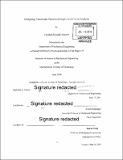Designing anisotropic friction through limit curve analysis
Author(s)
Vasquez, Elizabeth Danielle.
Download1130060195-MIT.pdf (4.794Mb)
Other Contributors
Massachusetts Institute of Technology. Department of Mechanical Engineering.
Advisor
Alberto Rodriguez.
Terms of use
Metadata
Show full item recordAbstract
Friction is an essential component of robotic manipulation which is highly dependent on contact surfaces. In practical applications, these surfaces are often anisotropic, a property that has been known to produce interesting movements in nature and uncertainty in human applications. Therefore, control of anisotropic frictional surfaces could result in more precise movement in manipulation, locomotion, and other facets touched by frictional contact. To arrive at such controllability, frictional force was collected across a spectrum of anisotropic micro-textures, and a limit curve was generated. Experimental data was analyzed in accordance to friction laws such as limit curve and maximum-inequality principle (MPI). Qualitative observation and residual sum of squares (RSS) was used to detect lack of normality and non-convexity within each limit curve. This lack of both normality and convexity contradicts MPI and suggests that an alternative model is necessary. Additionally, the anisotropic frictional behaviors observed advances the feasibility of "designing" micro-textures capable of controllable anisotropic friction.
Description
Thesis: S.B., Massachusetts Institute of Technology, Department of Mechanical Engineering, 2019 Cataloged from PDF version of thesis. Includes bibliographical references (page 26).
Date issued
2019Department
Massachusetts Institute of Technology. Department of Mechanical EngineeringPublisher
Massachusetts Institute of Technology
Keywords
Mechanical Engineering.